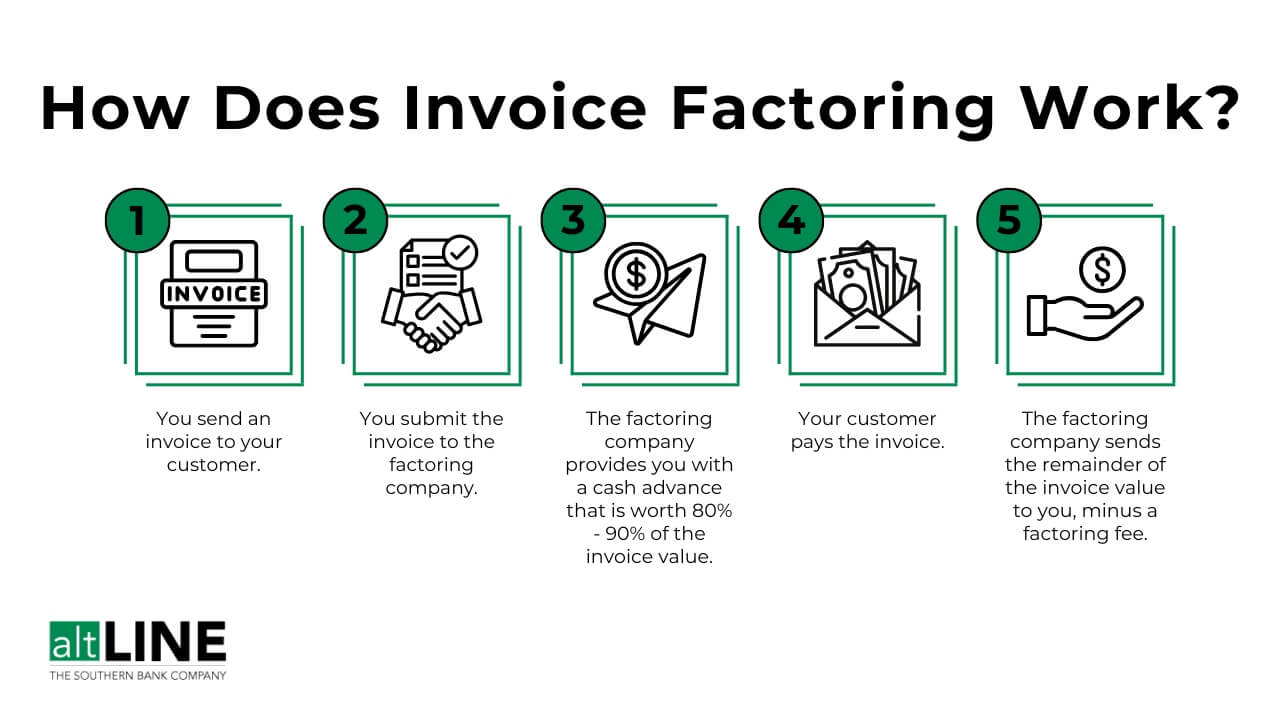Factoring in business works by selling your invoices to a factoring company, who then pays you immediately for them. This allows you to access immediate capital based on the future income from your accounts receivable or business invoices.
Factoring is also known as receivables factoring or invoice financing, and it helps improve cash flow by providing immediate payment for invoices, even if the payment deadline hasn’t expired yet. It’s important to note that there are different types of factoring, such as recourse and non-recourse factoring, which come with different levels of financial risk.
Factoring companies act as intermediaries that provide cash or financing by purchasing your accounts receivable. Overall, factoring provides businesses with a way to access immediate capital and improve cash flow.
Introduction To Factoring
Welcome to our guide on how factoring works in business. In this article, we will explore the concept of factoring, its benefits, and how it can help businesses improve their cash flow. Factoring allows businesses to access immediate capital or money based on the future income attributed to their accounts receivable or business invoices. With factoring, companies can turn their unpaid invoices into cash, providing them with the financial flexibility they need to grow and thrive.
Definition Of Factoring
Factoring, also known as receivables factoring or invoice financing, is a financial transaction where a factoring company purchases the invoices or debts from another company. This allows the selling company to receive payment immediately, even if the payment deadline for the invoices has not yet expired. The factoring company assumes the responsibility of collecting the payments from the customers mentioned in the invoices.
Benefits Of Factoring
Factoring offers several benefits to businesses, including:
- Improved Cash Flow: Factoring provides immediate cash flow by converting unpaid invoices into working capital. This allows businesses to cover expenses, invest in growth opportunities, and meet day-to-day financial obligations.
- Reduced Credit Risk: When a factoring company purchases the invoices, they assume the risk of non-payment from the customers. This helps protect businesses from potential losses due to defaulting clients.
- Flexible Funding: Unlike traditional loans, factoring is not based on the creditworthiness of the business. Instead, it relies on the creditworthiness of the customers. This makes factoring accessible to businesses with limited credit history or low credit scores.
- Outsourced Collections: Factoring companies often provide collections services, reducing the administrative burden on businesses. This allows them to focus on their core operations while the factoring company handles the payment collection process.
Overall, factoring can be a valuable financing solution for businesses looking to improve their cash flow and maintain a stable financial position. It provides access to immediate capital, reduces credit risk, and offers flexibility in funding, making it an attractive option for businesses of all sizes.

Credit: www.zoho.com
How Does Factoring Work?
Factoring is a financial practice that helps businesses improve their cash flow by selling their invoices to a third-party company. This process allows businesses to receive immediate cash based on the amount due on their outstanding invoices. Let’s take a closer look at the process of factoring and how it can benefit your business.
The Process Of Factoring
The process of factoring involves several steps:
- The business delivers its products or services to its customers and issues an invoice for payment.
- The business then sells the invoice to a factoring company, also known as a factor, at a discounted price.
- The factoring company verifies the invoice and the creditworthiness of the business’s customers.
- Upon approval, the factoring company advances a percentage of the invoice value, usually ranging from 70% to 90%, to the business as immediate cash.
- The factoring company takes over the responsibility of collecting payment from the customers.
- Once the customers pay the invoice, the factoring company deducts its fees and any other charges before remitting the remaining balance to the business.
Sale Of Invoices
When a business sells its invoices to a factoring company, it is essentially exchanging its accounts receivable for immediate cash. This can be beneficial for businesses that face cash flow challenges due to slow-paying customers. By selling their invoices, businesses can access the capital tied up in their accounts receivable and use it to cover their expenses, invest in growth, or take advantage of new opportunities.
Immediate Cash Flow
One of the main advantages of factoring is the ability to receive immediate cash flow. Unlike traditional financing methods, such as loans or lines of credit, factoring provides businesses with instant access to funds without taking on additional debt. This can be particularly advantageous for businesses that are growing rapidly or experiencing seasonal fluctuations in their cash flow.
In conclusion, factoring is a valuable financial tool that helps businesses improve their cash flow by selling their invoices to a factoring company. The process involves the sale of invoices, which provides immediate cash flow to businesses. This can be a beneficial alternative to traditional financing methods and can support the growth and stability of businesses in various industries.
Types Of Factoring
Factoring is a popular financing option for businesses looking to improve their cash flow. It involves selling accounts receivable, or unpaid invoices, to a factoring company in exchange for immediate cash. There are different types of factoring, each with its own unique characteristics. Let’s take a closer look at three common types: recourse factoring, non-recourse factoring, and spot factoring.
Recourse Factoring
Recourse factoring is a type of factoring where the business remains liable if the customer fails to pay the invoice. In this arrangement, the factoring company retains the right to recourse, which means they can pursue the business for the unpaid amount. This puts the business at greater financial risk, as they may have to repay the factoring company if the customer doesn’t pay.
Non-recourse Factoring
Non-recourse factoring, on the other hand, is a type of factoring where the factoring company assumes the risk of non-payment. If the customer doesn’t pay the invoice, the factoring company absorbs the loss and the business is not held liable. This type of factoring provides businesses with greater protection and peace of mind.
Spot Factoring
Spot factoring, also known as single invoice factoring, allows businesses to factor individual invoices instead of all their accounts receivable. This provides businesses with more flexibility and control over their cash flow. With spot factoring, businesses can choose which invoices to factor, giving them the ability to address immediate cash flow needs without committing to a long-term contract.
In conclusion, the different types of factoring offer businesses varying levels of risk, protection, and flexibility. Businesses can choose the type of factoring that best suits their needs and financial situation. Whether it’s recourse factoring, non-recourse factoring, or spot factoring, factoring provides businesses with a valuable tool to optimize their cash flow and fuel growth.
Factors To Consider In Choosing A Factoring Company
When choosing a factoring company, there are several factors to consider, such as the terms and fees, the company’s experience and reputation, and the level of customer service provided. It is important to choose a company that aligns with your business needs and can provide reliable cash flow solutions.
Factoring is a beneficial financial solution for businesses looking to improve cash flow and maintain steady operations. When it comes to choosing a factoring company, several crucial factors need to be considered to ensure that the chosen partner aligns with the specific needs and goals of the business. Selecting the right factoring company can significantly impact the business’s financial health and stability. Considering key factors such as cost and fees, experience and reputation, flexibility, and scalability is essential to make an informed decision.Cost And Fees
Understanding the cost and fee structure of a factoring company is vital before entering into a partnership. Key considerations include the factoring rate, setup fees, and any additional charges that may apply. Comparing these costs across different companies will help in making an economical choice.
Experience And Reputation
The experience and reputation of a factoring company are crucial in determining the reliability and quality of service. Researching the company’s track record, client testimonials, and industry partnerships can provide valuable insights into their credibility and performance.
Flexibility And Scalability
A factor that is often underestimated is the ability of the factoring company to accommodate the business’s changing needs. Assessing their flexibility in handling varying volumes of invoices and the scalability of their services is essential for long-term compatibility.
Risks And Considerations In Factoring
Factoring can be an advantageous financial tool for businesses seeking to improve their cash flow. However, it’s crucial to be aware of the risks and considerations associated with factoring as well. Understanding these aspects can help business owners make informed decisions that align with their long-term goals.
Recourse Vs. Non-recourse Factoring
Recourse factoring introduces additional financial risk, as the factoring company can hold your business liable if the client fails to pay the invoice. On the other hand, in non-recourse factoring, the factoring company assumes the risk of non-payment, offering a layer of protection for your business against potential losses.
Impact On Customer Relationships
It’s important to consider the potential impact on customer relationships. Some clients may have concerns or reservations about interacting with a third-party factoring company, which could affect their perception of your business. Open communication and transparency about the factoring process can help mitigate any negative impact on customer relationships.
Loss Of Control
When engaging in factoring, businesses may experience a loss of control over the collection process of outstanding invoices. This shift in control could potentially impact the overall administration of accounts receivable, requiring careful consideration of the impact on internal operations and financial management.

Credit: altline.sobanco.com

Credit: www.invoicefactoring.com
Frequently Asked Questions Of How Does Factoring Work In Business
How Do You Get Paid From A Factoring Company?
To get paid from a factoring company, you sell your invoices to them and they pay you immediately for them. It’s a way to get immediate cash based on a percentage of the invoice value.
What Is A Typical Factoring Fee?
A typical factoring fee is a fee charged by a factoring company for purchasing invoices or debts from another business. The fee is usually a percentage of the invoice value and provides immediate cash to the selling business.
What Are The Risks Of Factoring A Business?
Factoring a business can have risks. In recourse factoring, if your client doesn’t pay, the factoring company can come after your business for the amount. Non-recourse factoring transfers the risk to the factoring company.
What Is Factoring In Business Examples?
Factoring in business involves a company selling its invoices to get immediate payment. For example, a trucking company may sell its invoices to a factoring company to receive immediate funds instead of waiting for the payment deadline.
Conclusion
Factoring in business is a beneficial financial solution for companies looking to improve cash flow and access immediate capital. By selling their invoices to a factoring company, businesses can receive immediate payment for outstanding invoices, even if the payment deadline has not yet expired.
This helps businesses overcome financial challenges and maintain a steady cash flow. Additionally, factoring companies can absorb the risk of non-payment, reducing the financial burden on businesses. Overall, factoring provides a flexible and efficient way for businesses to manage their finances and support their growth.